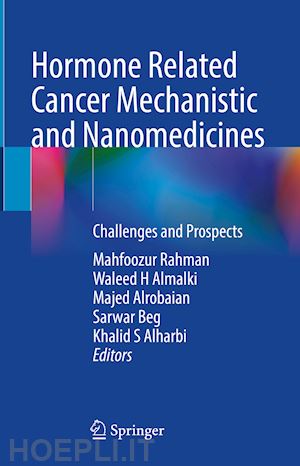
Questo prodotto usufruisce delle SPEDIZIONI GRATIS
selezionando l'opzione Corriere Veloce in fase di ordine.
Pagabile anche con Carta della cultura giovani e del merito, 18App Bonus Cultura e Carta del Docente
The nanotheranostics sector provides a very promising strategy for monitoring drug biodistribution and pathology longitudinal processes by integrating the imaging and drug delivery functions in one single nanoformulation, providing vital insights into the identification of tumour and predicting the efficacy of nanomedicine. For its unique properties, which include their small size and biocompatibility and ability to permeate the cellular membrane with carrying drugs, nanomaterials have been used for various biomedical applications. This book covers the progress made in hormone-related cancer and their management by nonmedicinal therapy for targeting the hormone regulated cancer with their clinical progress and clinical hurdles.
Mahfoozur Rahman, Ph.D. is serving as Assistant Professor at the Department of Pharmaceutical Sciences, Faculty of Health Science, Sam Higginbottom University of Agriculture, Technology & Sciences (SHUATS), Allahabad, India. His major areas of research interest include development and characterization of nanosized drug delivery systems for cancer and inflammatory disorders including psoriasis, arthritis, and neurodegenerative disorders, etc. To date, he has published over 150 publications in peer-reviewed journals, 50 book chapters, 07 International books, and 04 articles in international magazine. He has Google Scholar H-index of 32 and over 3200 citations to his credit. Dr Rahman also served as Guest Editor of several journals including Seminar in cancer Biology. Besides, Dr Rahman got travel grant from various international congress such as IAPRD, MDS, Nano Today Conference, KSN, WCN, on the basis of his research work and contribution in the field.
Waleed Hassan Almalki, PhD, is a Professor of Pharmacology at the College of Pharmacy, Umm Al-Qura University, Makkah, Saudi Arabia. He earned his doctoral degree at the University of Glasgow, United Kingdom, having a dissertation on ocular pharmacology. His current research is focused on the broad areas of host-virus networks in hepacivirus C disease progression as well as host- virus genes expression during oxidative stress, hepatic steatosis, fibrosis, and hepatocellular carcinoma. He is also enthusiastically involved in the studies of tyrosine kinase inhibitors for the treatment of breast and colon cancer, in the Saudi population. Dr. Almalki has published many research and review articles in peer-reviewed international journals on HCV pathogenesis, treatment, and drug designing, as well as edited various book chapters about angiogenesis, pharmacological assays, and infectious disease epidemiology.
Majed Al Robaian, Ph.D., Dean, Faculty of Pharmacy, Taif University in Saudi Arabia Majed Al Robaian, PhD, is the Dean of the Faculty of Pharmacy at Taif University in Saudi Arabia. He obtained his BSc from King Saud University in Riyadh, Saudi Arabia, and his MSc in Pharmaceutical Sciences from Strathclyde University in the United Kingdom in 2010, and his PhD from the same university in 2014. His research interests focus on drug delivery and, in particular, the delivery of therapeutic genes for the treatment of cancer. Before obtaining his PhD, he worked as Director of Pharmacy at King Abdul-Aziz Hospital. Currently, he is appointed as the Science Faculty Ambassador for Strathclyde University. He is a member of a number of committees in the Saudi Commission for Health Specialties.
Sarwar Beg, Ph.D, is currently serving as Assistant Professor at Department of Pharmaceutics, School of Pharmaceutical Education and Research, Jamia Hamdard, New Delhi. He has over a decade of teaching and research experience in the field of pharmaceutics and biopharmaceutics, especially in the development of novel and nanostructured drug delivery systems using Quality-by-Design paradigms. Before joining Jamia Hamdard, Dr Beg worked as a Research Scientist at Jubilant Generics Limited, Noida, India. He has authored over 160 publications, 48 book chapters, 12 books, 03 Indian patent applications and served as Guest Editors of the various international journals. He has a Google Scholar H-Index of 29 and over 3200 citations to his credit.
Khalid S. Alharbi, PhD, is an Assistant Professor in department of Pharmacology and Toxicology, College of Pharmacy, Jouf University, Sakaka, Saudi Arabia. He obtained both his BSc (Pharmaceutical Sciences, 2002) and MSc (Toxicology, 2009) at the College of Pharmacy at King Saud University (KSU), Riyadh, Saudi Arabia. He was awarded his PhD (Pharmacy and Biomedical Sciences, 2016) from Strathclyde University, United Kingdom. Dr. Alharbi’s major area of research is cancer, including drug discovery, nanomedicine, and preclinical pharmacological and toxicological studies of anticancer agents. He has published several articles in peer-reviewed journals and presented papers at numerous international conferences.











Il sito utilizza cookie ed altri strumenti di tracciamento che raccolgono informazioni dal dispositivo dell’utente. Oltre ai cookie tecnici ed analitici aggregati, strettamente necessari per il funzionamento di questo sito web, previo consenso dell’utente possono essere installati cookie di profilazione e marketing e cookie dei social media. Cliccando su “Accetto tutti i cookie” saranno attivate tutte le categorie di cookie. Per accettare solo deterninate categorie di cookie, cliccare invece su “Impostazioni cookie”. Chiudendo il banner o continuando a navigare saranno installati solo cookie tecnici. Per maggiori dettagli, consultare la Cookie Policy.